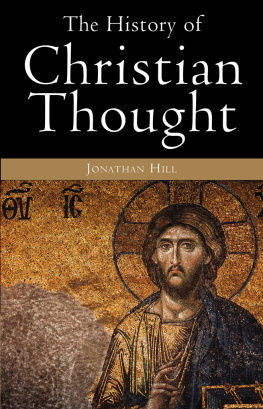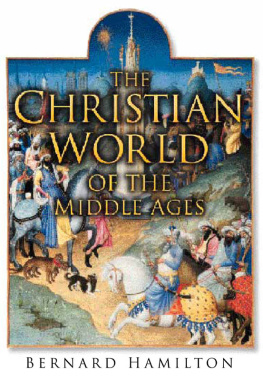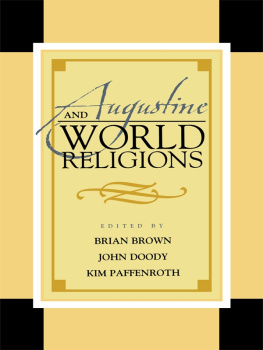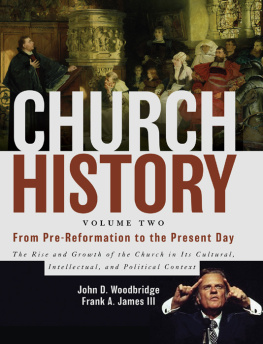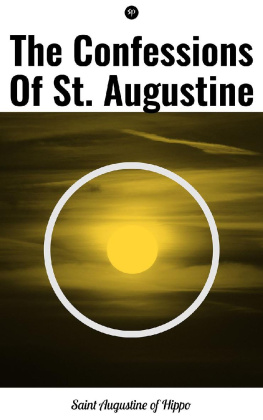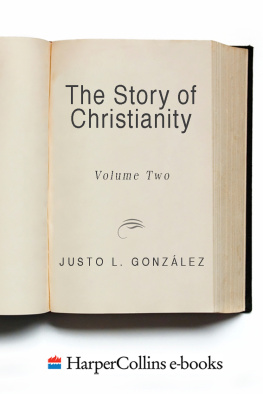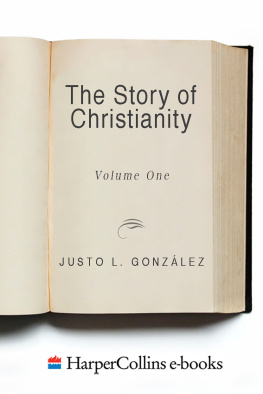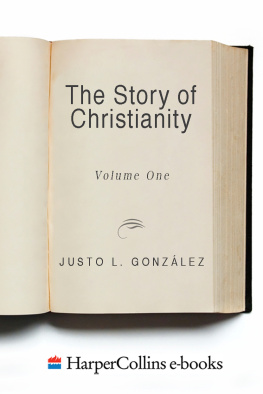From Augustine to
the Eve of the
Reformation
A HISTORY OF CHRISTIAN THOUGHT, REVISED EDITION VOL. II
Copyright1971 by Abingdon Press
Appendix, Preface to the Second English Edition, footnotes, and editorial revisions
copyright 1987 by Abingdon Press.
All rights reserved.
No part of this work may be reproduced or transmitted in any form or by any means, electronic or mechanical, including photocopying and recording, or by any information storage or retrieval system, except as may be expressly permitted by the 1976 Copyright Act or in writing from the publisher. Requests for permission should be addressed in writing to Abingdon Press, 201 8th Avenue South, Nashville, TN 37203.
This book is printed on add-free paper.
ISBN 0-687-17183-0 (v. 2)
ISBN 0-687-17185-7 (the set)
ISBN 13: 978-0-687-17183-5
Library of Congress Catalog Card Number:
74-109679
The quotations from Si. Anselm's Proslogion, edited and translated by M. J. Charlesworth, and published in 1963, are used by permission of The Clarendon Press, Oxford, England.
Quotations from Summae Theologiae of St. Thomas Aquinas, edited by T. Gilby (vols. 1,2, 3 1964 by Blackfriars; vol. 5 1967 by Blackfriars), are used with permission of the McGraw-Hill Book Company.
08 09 10 11 12 13 14-40 39 38 37 36 35 34 33 32
MANUFACTURED IN THE UNITED STATES OF AMERICA
Preface to the Second
English Edition
It has now been more than ten years and ten printings since the first publication of A History of Christian Thoughtthe first volume was published in English in 1970, and the third in 1975.1 have been extremely pleased by its widespread use in universities and seminaries. I am also grateful to colleagues who, both in published reviews and in personal correspondence, have suggested ways in which that first edition could be improved. In the preparation of this revised edition, I have endeavored to take account of their criticism and suggestions.
It is still my purpose to produce a book that can serve as an introduction to the subject for readers with little or no theological training, giving them both the basic knowledge needed for further theological and historical studies and a vision of the rich variety of Christian thought through the ages. Therefore, I have sought to avoid sweeping generalizations or purely personal views, which might make the book more interesting to my colleagues, but less useful to my intended readers.
The changes in this new edition are many. Most of them are bibliographical matters, updating references and taking into account more recent research. Where such research has led me to correct my views on a particular subject, this is reflected in changes in the text. Some chapters have been radically reorganizedin particular, the chapter on nineteenth-century Protestant theology. At the suggestion of numerous reviewers, I have also added a chapter on contemporary theology.
Since the first edition was published, I have also become aware of two factors deeply affecting the history of Christian theology, and seldom sufficiently recognized. The first is the liturgical and communal setting in which theology develops. A fuller understanding of medieval theology, for instance, would require a parallel consideration of theological treatises and discussions on the one hand and of the monastic liturgy of the hours on the other. While connections between liturgy and theology appear repeatedly throughout these three volumes, I feel that there is much more work to be done in this area, and I confess that I have not done enough of it to weave the two into a single fabric throughout the entire history of Christianity.
The second factor in the history of Christian theology of which I have become more profoundly aware is the social and economic context and content of theology. This is a field to which I have been devoting much interest in recent years. My studies along these lines have enriched my appreciation for many of the theologians discussed in these three volumes, and deepened my understanding of a number of abstract theological issues. I have referred to economic matters at a few points in this revised edition. However, given the purpose of this book, to serve as an introduction to students who do not necessarily know the more traditional interpretations, I have refrained from rewriting the entire history from the perspective of this particular insight. I hope to do this in two separate works now in preparationone on the history of Christian views on economics, and another on how the different types of theology that can be discerned in the history of Christianity relate to these and other issues.
To a large degree, history is autobiographyor perhaps one should say that it is the prolegomena to one's biography. In any case, our view of who we are, both as individuals and as a community of faith, depends in large measure on what we understand our history to be. As this revised edition goes to press, it is my prayer that its readers will gain new understandings from it, and thus be aided in what is after all the primary task of the Christian community: being faithful and obedient in the world in which we have been placed.
J. L. G.
Decatur, Georgia
September 19, 1986
Preface to the First
English Edition
There is always a certain awkwardness to writing a Preface, for the author is acutely aware that what he writes last may well be what his reader will read first. In this particular case, this awkwardness is compounded by the fact that this is a "Preface to the Second Volume" of a three-volume series, and I therefore feel tempted to use it as an opportunity to sum up what I have done to this point, and to project how I plan to develop the third volume.
This temptation, however, I shall resist, apart from two comments as to the scope and plan of this second volume. The first is that, just as in the first volume I deemed it wise not to include Augustine, but rather to begin with him in this second volume, I now have decided to bring the story of the development of Christian thought only up to the eve of the Reformation, and to leave out of this second volume both the Reformation itself and any detailed discussion of the Renaissance and Humanism. These subjects will be the starting point of the final volume of this History. The second comment that I must make is that here again I have attempted to make this History fully ecumenical, and have included in it developments within the Eastern churches which are usually passed in silence. If the reader finds that the periodic incursions into Eastern theology interrupt the flow of the narration, it should be a simple matter to read the various chapters dealing with the Eastern and Western churches in an order more suitable to his interests.
Finally, a word of gratitude. Once again, those to whom I owe the possibility of writing this book are too numerous to mention. Therefore, the names that I do mention stand as symbols for all those to whom gratitude is due. The librarians of Yale Divinity School and the Evangelical Seminary of Puerto Rico, Dr. Raymond P. Morris and Miss Wilma Mosholder, have been most kind and generous in their help, the former during a sabbatical which I spent at Yale while preparing the manuscript for this book, and the latter by securing hundreds of volumes which were necessary for my research. To this end, the Theological Education Fund contributed a substantial grant, and for that, too, I am grateful. Although the typing of the manuscript was shared by several persons, the heaviest load was carried by Mrs. Ramonita C. de Brugueras, who also typed the entire Spanish manuscript; Miss F. Elizabeth Adams; and Mrs. June B. Caldwell. I wish to record my indebtedness to them, not only for their work, but also for the interest that they have shown in the project itself.


